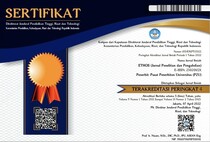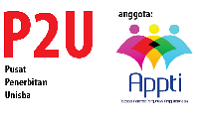Peningkatan Kemampuan Pengelolaan Bisnis Guru Slb Tuna Rungu
Abstract
Abstract. There are 36 teachers at SLB Negeri-B Cicendo Bandung (state school for students with hearing impairment), divided into: 3 kindergarten teachers, 9 elementary school teachers, 6 junior/middle school teachers, 3 high school teachers, and 15 subject teachers. They teach according to the Special Education Curriculum using sign language and written media. In order to equip the students with practical skills, Entrepreneurship Education is taught at SLB where students learn production to business management in the form of students and teachers’ cooperative. Frequent constraints in their operational activities are incomes which are not in accordance with the products sold or profit reports which show different results with the calculations and cause the loss for cooperative business and the products produced cannot develop optimally. The PKM (Student Creativity Program) team seeks the solutions to these problems through training program/activities of creating business plans for SLB teachers accompanied by three mentoring meetings. The output of the activities is a business plan document prepared by SLB teachers in groups. The PKM team expects that a good and comprehensive understanding of business plan can be taught by SLB Teachers to their students and have an impact on the management of the students’ pilot businesses.
Abstrak. Terdapat 36 Guru SLB di SLB Negeri-B Cicendo Bandung. Guru SLB atau pengajar di SLB tersebut terbagi menjadi 3 orang Pengajar TK, 9 Pengajar SD, 6 Pengajar SMP, 3 Pengajar SMA, dan 15 Guru Pengajar Mata Pelajaran. Para Guru SLB ini memberikan pengajaran sesuai kurikulum Pendidikan Khusus dengan menggunakan Bahasa Isyarat dan media tulisan. Pembekalan kepada siswa SLBN-B juga diberikan dalam bentuk Pendidikan Kewirausahaan, mulai dari Produksi sampai dengan Pengelolaan hasil usaha dalam wujud Koperasi Siswa dan Guru. Pada kegiatan operasionalnya kendala yang sering terjadi adalah pendapatan yang tidak sesuai dengan produk yang terjual atau Laba yang tertulis tidak sama dengan hasil perhitungan yang menyebabkan bisnis koperasi bahkan produk yang dihasilkan tidak dapat berkembang dengan optimal. Tim PKM berupaya memberikan solusi dari permasalahan tersebut melalui pelatihan pembuatan business plan bagi Guru SLB disertai tiga pertemuan pendampingan. Luaran dari kegiatan ini berupa dokumen business plan yang disusun oleh Guru SLB secara berkelompok. Harapan Tim PKM adalah agar pemahaman yang baik tentang business plan dapat diajarkan oleh Guru SLB kepada para siswa SLBN-B Cicendo yang dapat berdampak pada pengelolaan usaha rintisan siswa.
Keywords
Full Text:
PDFReferences
Alma, Buchari. (2011). Kewirausahaan Untuk Mahasiswa dan Umum. Bandung: Penerbit Alfabeta
Basrowi. (2011). Kewirausahaan Untuk Perguruan Tinggi. Bogor: Ghalia Indonesia
Direktorat Pendidikan Luar Biasa Departemen Pendidikan Nasional. (2004). Alat Identifikasi Anak Berkebutuhan Khusus. Jakarta: Direktorat PLB Departemen Pendidikan Nasional.
Halimatussadiah, A., Agriva, M., & Nuryakin, C. (2015). Persons with Disabilities (PWD) and Labor Force in Indonesia : A Preliminary Study (LPEM-FEUI No. 003). Jakarta. ILO. (2013). Inklusi Penyandang Disabilitas di Indonesia. Jakarta.
Lambing, Peggy. (2000) dan Charles R. Kuehl. Entrepreneurship, Prentice Hall, Upper Saddle River.
Loprest, P., Rupp, K., & Sandell, S. H. (2016). Gender , Disabilities , and Employment in the Health and Retirement Study. The Journal of Human Resources, 30(1995).
LPEM FEB UI. (2017). Laporan Akhir Memetakan Penyandang Disabilitas (PD) di Pasar Tenaga Kerja Indonesia. Jakarta: Organisasi Perburuhan Internasional.
Mitra, S. (2013). Is There a Disability Gap in Employment Rates in Developing Countries? World Development, 42(March 2012), 28–43. http://doi.org/10.1016/j. worlddev.2012.05.037
Oguzoglu, U. (2009). Severity of Work Disability and Work. Bonn:
IZA.Potts, B. (2005). Disability and Employment: Considering the Inportance of Social Capital. Journal of Rehabilitation, 71(3), 20–25.
DOI: https://doi.org/10.29313/ethos.v7i2.4727
Refbacks
- There are currently no refbacks.
Alamat Redaksi:
LPPM Unisba, Lantai 2, Jl. Purnawarman 63, Bandung 40116, Jawa Barat, (022) 4203368 , (022) 4264064. ethos.unisba@gmail.com / ethos@unisba.ac.id

This work is licensed under a Creative Commons Attribution-NonCommercial-ShareAlike 4.0 International License.














